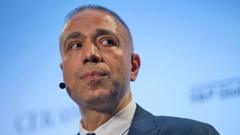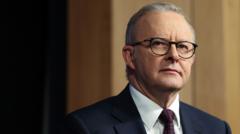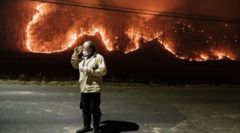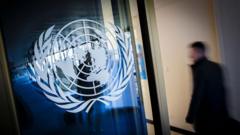The integrity of the COP29 climate change conference is called into question as recorded conversations reveal Elnur Soltanov, the executive in charge, discussing fossil fuel investment opportunities. The incident raises concerns about the commitment of host nations to the climate agenda and the ongoing reliance on fossil fuels.
Allegations Surface Against COP29 Chief for Promoting Fossil Fuel Deals

Allegations Surface Against COP29 Chief for Promoting Fossil Fuel Deals
Elnur Soltanov, chief executive of COP29, caught on hidden camera discussing potential oil and gas investments amid preparations for the climate conference.
Elnur Soltanov, the chief executive of Azerbaijan's COP29 climate conference, has come under fire following revelations that he allegedly leveraged his position to promote fossil fuel investment opportunities. The BBC obtained secret footage of Soltanov engaged in discussions about potential deals related to gas and oil with an individual posing as a prospective investor, which ignites debates about the COP process's integrity and its commitment to combatting climate change.
In the recording, Soltanov suggests that Azerbaijan offers numerous gas fields primed for development and speaks about "investment opportunities" within the state oil and gas company, Socar. His dual role as deputy energy minister and board member of Socar raises further questions about potential conflicts of interest, especially in a country where oil and gas dominate the economy, constituting around half of GDP and over 90% of exports.
The timing of these allegations is particularly sensitive, as the COP29 summit is set to kick off in Baku on Monday. This annual conference serves as a platform for nations to deliberate on mitigating climate change effects, raising aspirations to address the climate crisis. However, this incident follows a pattern highlighted by past BBC investigations into host nations allegedly misusing their roles to further fossil fuel agendas, raising concerns about accountability within the COP framework.
Experts, including former UN climate negotiators, have condemned Soltanov's actions as a "betrayal" of the conference's goals. They argue that COP events should focus on decreasing fossil fuel reliance rather than facilitating its expansion. Critics stress that promoting new fossil fuel developments contradicts the international commitment to restrict global warming to below 1.5°C, as endorsed at previous summits.
During a meeting with the fake investor, Soltanov indicated a willingness to aid in creating connections with Socar, demonstrating an eagerness to discuss business ventures alongside stated efforts towards a "just" energy transition. He labeled natural gas as a "transitional fuel," suggesting that oil and gas production could persist indefinitely. While climate science recognizes some necessary role for fossil fuels through 2050, the environmental implications of establishing new fields are starkly at odds with global climate goals.
The United Nations Framework Convention on Climate Change (UNFCCC) sets a code of conduct for COP officials, which emphasizes impartiality and a duty to act without favoritism. Allegations against Soltanov suggest a violation of these terms, shining a spotlight on the broader issue of host countries' roles in climate negotiations.
Christiana Figueres, who facilitated the historic Paris Agreement in 2015, expressed her concerns about the implications of such dealings, labeling them outright treason against the purpose of the COP process. Emails uncovered reveal additional attempts to negotiate sponsorship deals based on these fossil fuel discussions, illustrating a troubling willingness to blur the lines between climate advocacy and commercialization.
With COP29’s commencement just days away, the focus on these allegations raises significant questions about the commitment of host nations to legitimate climate action and the efficacy of the COP framework in fostering genuine progress on global warming.























